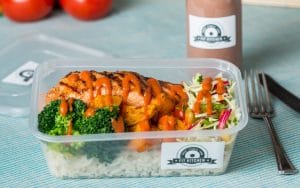Amar, why did you decide to launch Fit Kitchen?
I developed Fit Kitchen because of my own personal experience and passion for healthy living. In my former role as CEO of a national company working 15 hour days, six days a week, and trying to fit in early morning or late evening workouts, I had no time whatsoever to prepare my meals based on my training goals, body goals and lifestyle. I tried other food delivery services but felt the food was often bland and I was tied into an expensive subscription model – so a solution was needed.
In 2014 I stepped down from my previous role and spent a year planning, testing and developing the Fit Kitchen model from my home kitchen. Our first customer, who is still with us today, offered me a cheque and said “I want to be as fit as you. Can you plan my diet and my food and deliver it to me every day?”
Tell me more about the business. What do you hope to achieve?
The ultimate goal is to help a huge number of people lead healthier lives but, from a shorter term perspective, we have a lot of exciting ideas in the works to expand the Fit Kitchen business model to be bigger and better. We are constantly evolving our platform based on customer feedback to ensure it is as effective and user-friendly as possible, and are also expanding into gyms via retail pods that let members order meals as they’re entering or exiting the gym.
What businesses were you involved in before you launched Fit Kitchen and how did that help you set up the new business?
In 2009 I founded The Small Business Consultancy, a social enterprise that started off as a one-man operation run out of my bedroom and ended up growing into a national social enterprise and charity with £0.5m turnover in just three years. TSBC supported troubled youths in using business to change their own lives, and we helped over 6,000 people across the UK make a fresh start. I was named as one of the top 100 social entrepreneurs in the UK, and one of the LiveWIRE top 20 entrepreneurs in London, managing a team of 20 staff and advising Downing Street and the Cabinet Office.
Something I learnt after my exit from such a privileged position of being able to support people in need but also create jobs is that enterprise drives the country. Think of Sainsbury’s, it started just like your local grocer with one store. From local shops to big businesses it’s all fuelled by enterprise and usually one person’s idea and passion that then creates jobs for people, and fuels a supply chain.
In business terms, what were the challenges of setting up Fit Kitchen? What failures have you faced in business, and how did you get past these?
All businesses have challenging days during the start-up phase and Fit Kitchen has been no different, we have experienced unexpected challenges with suppliers, technology and more, but it’s all part of the journey and provided key learnings to develop the business. One major ‘failure’ for the business came in 2015 when I fully planned out a retail site that we thought had been secured however at the 11th hour the landlord pulled out of the sale leaving me almost bankrupt and with no site or venue for the bricks and mortar business I had planned.
In every adversity you can find seeds of opportunity though and almost immediately afterwards I was introduced to the client of a trainer friend of mine who offered me the opportunity to plan, cook and deliver his food from my home kitchen – Fit Kitchen’s new digital model was born, and has continued to evolve ever since. Those who never give up, never lose!

What makes Fit Kitchen different from other brands in this sector?
We believe in putting the customer experience above everything else and, as a result, we don’t have any lock-in contracts or commitments, because we appreciate our customer’s requirements might change week to week. We also understand that all our customers have different goals and starting points, so we offer a level of personalisation greater than any other service to make sure meals are perfectly tailored to our customer’s goals. I can also confidently say that our food really does taste fantastic, and our customers agree! We have over 64,000 different meal combinations available through the site and the taste and quality of the food is prioritised for each one.
In, say, five years, what would constitute success? Where would you like to be?
I hope in five years that everyone who likes to lead, or has a willingness to live, a healthy life has heard of us, and at least half of those have tried our food. From a business sense, I feel it’s a bit early to tell where we will be financially, but I hope that like all successful enterprises we are helping to create more jobs, supporting the economy, and being part of a healthy supply chain.
What’s been your proudest moment to date with Fit Kitchen?
I think for me the biggest achievement has been creating and developing the technology behind Fit Kitchen which we are constantly evolving to best suit customer needs. The first time I received a meal that I had ordered through the system was also a fantastic moment.
If an aspiring business person came to you and asked for advice about setting up on their own, what would you say?
Don’t think about the money first, be driven by your passion and be a ‘passionpreneur’! If you’re only driven by the money it’s unlikely you will be able to motivate yourself through the challenging days that every business has. Passion is a currency of its own in my experience and customers can sense when someone is genuinely devoted to the business.
If you had to sum up your approach to business in three words, what would they be?
Driven by passion
You’re clearly a fit guy. Talk us through your weekly eating and training regime.
I follow a work-out plan devised by my coach Fabio Bonanno, who has 16 years of fitness experience and works with many other businesspeople and CEOs to help them achieve optimum fitness. I work out six days a week. Currently I am working with my coach on a highly intense hypertrophy programme which was developed by South African bodybuilder Ben Pakulski, its 40 days of gruelling low rest changing volume sets, otherwise known as MI40. Additionally, to reach my goals I follow a macros tracking approach consuming 2,714 calories for five days of the week and 3,883 calories for my two ‘high’ days each week which are scheduled to aid recovery, and support heavy legs sessions as these large muscle groups require additional fuel for optimum performance.

